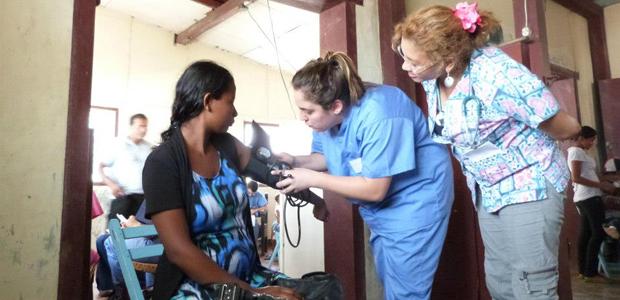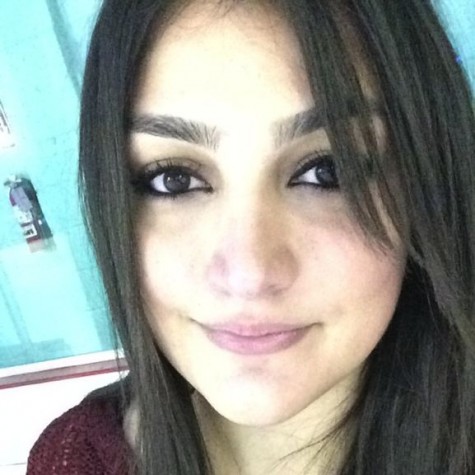While boarding the plane in Houston, president of GCC’s Global Medical Training club Garen Koocharian knew that the next thing he was probably going to see were dirt roads.
During spring break, GMT visited Nicaragua to help doctors treat patients in towns where medical aid is limited, traveling from the capital city of Managua to Granada, a popular tourist site, and Masaya, where most of GMT’s clinics are located.
As the plane landed in Managua, the Nicaraguan capital, Koocharian looked down to see a huge mountain to the side, the dreaded dirt roads, and houses made of metal sheets. Recounting a prayer in Armenian, asking “God, where did you bring us? Why are we here right now?” he turned to his co-president, Hagop Jack Mkroyan, and said he wished the plane would just turn around and take them back to the United States. At that point, Mkroyan, put off by the intense humidity, said he simply wanted to find his friends, get their luggage, and get to the hotel room to take a shower.
On the way to the hotel room, Koocharian looked around to see dry fountains carrying lights instead of water and wondered why the capital city was so dirty. It then dawned on him just how much their aid was really needed.
Despite the poor conditions of Managua, however, he said he couldn’t help but find the country beautiful in its pain and resolve to survive.
“It just looked like this beaten down country, like someone kept beating it with a stick,” Koocharian said. “You could really see the pain and the hurt of the country, and so I just thought wow, we really need to help these people.”
Participating students had to undergo training specific to the country they were volunteering in before they could actually work with patients. They mostly learned how to identify symptoms for illnesses, such as urinary tract infections, sexually transmitted diseases and parasites.
During their trip, the club had five clinical days, during which they treated patients. After leaving Managua and completing their orientation, they travelled to Granada and Masaya.
One of the most common cases was bacterial vaginosis, a type of vaginal infection, which Koocharian contributed to poor hygiene due to the lack of resources and bathrooms. He said most people had to make do with holes that are dug in the ground.
According to Mkroyan, most of their cases also involved patients who had parasites, particularly ring worms and were suffering from malnutrition. Many of the children they saw had two different hair colors, a common sign of malnourishment. Both Mkroyan and Koocharian said most of the children had parasites as well, so they often prescribed Albendazole and vitamins.
Pamela Avila, a member of GMT majoring in English and Journalism, was the only student to attend the trip that was not a pre-med or biology major. Of Mexican heritage, she experienced no language barriers but still underwent “a huge culture shock” due to the amount of poverty and disease that is part of Nicaraguan life.
Koocharian said that though some of the people in Nicaragua often look healthy due to their high amount of physical activity, they generally are not once you “dig deeper.” He recalls a patient who had a “six-pack,” but had a urinary tract infection, which is highly uncommon among men.
On their last day, Mkroyan and Koocharian worked with a patient who suffered from pelvic inflammatory disease for 28 years. PID causes swelling of the fallopian tubes and damage to the ovaries, the uterus, and often leads to infertility, according to webmd.com. Both she and her husband also suffered from diabetes, with a blood sugar level of 200. At most, blood sugar levels should be at 125, Koocharian said. The husband informed them that he drank at least one bottle of soda a day. Due to the lack of clean and accessible water, they drank soda as a means of hydration.
Though Mkroyan and Koocharian told them they needed to go to a hospital immediately, the couple had no way of reaching one. Where Glendale has several hospitals in its vicinity, Masaya has no health facility and Nicaraguans have to travel for hours before they can reach one. Even if they manage to get to a hospital, doctors may only be there once or twice a week and they see hundreds of patients during that time.
“Here [in the United States], we complain about the smallest thing, like a paper cut, and run to the hospital,” Koocharian said. “There, they just have to deal with it because there are no hospitals.”
One of Mkroyan’s patients, an elderly man, had an enlarged testicle that was caused by water entering his gonad. They referred him to a doctor for surgery, as one of their limitations was they did not have all of the equipment they needed at the clinic sites to fully help patients with their needs.
“Part of the problem is that many Nicaraguans do not have access to healthcare, even though all expenses are covered by the government,” Mkroyan said. “Most of them live under conditions that are unfathomable to the average American.”
For Mkroyan and others, the trip not only allowed them to make a difference but reassured their decision to enter the medical field.
“It was a rewarding experience that I will never forget,” he said. “I cannot wait to go to Nicaragua again and save more lives.”


